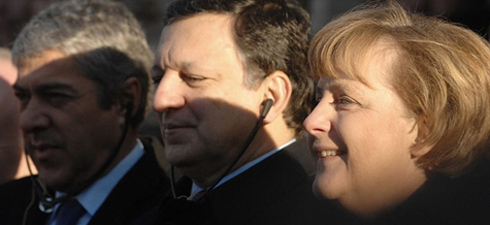Angela Merkel was locked in talks about the euro crisis when the phone rang in the gleaming chancellery in Berlin.
The Portuguese prime minister, José Sócrates, was on the line from Lisbon with a plea for help. Portugal is tipped to be the third of 17 eurozone countries to collapse under the weight of its sovereign debt, needing a German-led bailout. Sócrates sounded desperate and eager to please, according to witnesses.
He asked Merkel what he should do, promised to do anything she wanted, with one big exception. He would not ask for money – for a eurozone bailout with extremely tight strings attached.
According to accounts circulating in Berlin, Merkel left Sócrates to wait while she sought the views of her high-powered visitors – Dominique Strauss-Kahn, the French head of the International Monetary Fund, and Giulio Tremonti, the highly regarded Italian minister of economy who has recently been lobbying for the introduction of "Eurobonds" as part of a solution to the year-long crisis.
Merkel asked Strauss-Kahn about Sócrates' dilemma. The German-speaking IMF chief was dismissive. The Portuguese plea was pointless, he said, because Sócrates would not follow any advice he was given.
The exchange, which occurred last week in Berlin, highlights what a senior German official describes as "Europe's big communication problem". Read full article in the Guardian...
Exiting crisis
Brussels wants more cuts, more money
To escape from the debt crisis engulfing the eurozone, government leaders have in their hands "a comprehensive plan" sent to them by the Commissioner for Economic and Monetary Affairs, reports Der Spiegel. Over eleven pages, Olli Rehn asks member states to reform their labour markets and cut social spending. But the heart of the document sketches out a reform of the European Financial Stability Facility.
The European Commission wants the EFSF to make genuinely available the €440 billion put on the table by the governments last May. For now, as only a few countries have been awarded the triple-A rating by the rating agencies, the EFSF must pay substantial guarantees on its loans, and only €250 billion can be mobilised to support states in difficulty. Thus it is the countries with the highest ratings, led by Germany, who are being asked to contribute most to the EFSF. Berlin, however, is opposed to increasing the funds.
The Commission is also proposing that the EFSF be able to buy back bonds of governments in difficulty to ease the burden on the European Central Bank, and to assist countries seeking to buy back bonds that they sold at excessively high interest rates, in order to reduce their debt. Finally, the penalty interest would be lower when a country used the money provided by the EFSF.
"If the Commission succeeds in pushing its plan through, it is already clear what the result will be," writes Der Spiegel: "The countries concerned would be more indebted to their partner countries” in the Euro zone “and less to the markets, both domestically and abroad."
These rescue funds should also be used to assist banks that run into financing problems. Governments have until early February to amend the proposals from Olli Rehn.
Was this article useful? If so we are delighted!
It is freely available because we believe that the right to free and independent information is essential for democracy. But this right is not guaranteed forever, and independence comes at a cost. We need your support in order to continue publishing independent, multilingual news for all Europeans.
Discover our subscription offers and their exclusive benefits and become a member of our community now!












